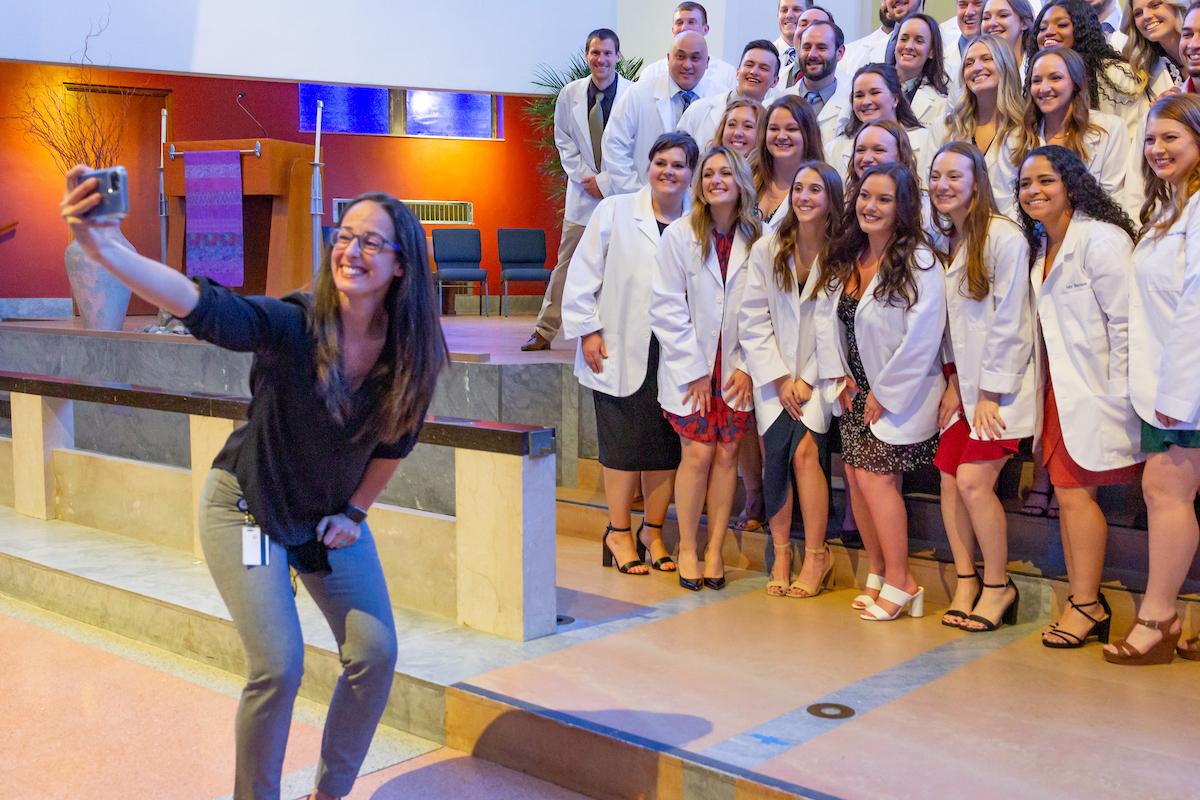
Because a Doctor of Physical Therapy signifies that the holder is eligible to sit for the American Physical Therapy National Examination and signifies that the holder is prepared for entry into the profession of physical therapy, it follows that graduates must have the knowledge and skills to function in a broad variety of clinical, private, community, or school-based situations and to render a wide spectrum of physical therapy services. Therefore, all students admitted to the program must meet the following abilities and expectations:
- Observation: The candidate must be able to observe demonstrations and learn from experiences in the basic sciences and in the clinical physical therapy laboratory, such as accurately reading dials on electrotherapeutic equipment, accurately reading numbers on a goniometer; hearing heart and breath sounds; assessing normal and abnormal color changes in the skin; and observe pupil changes.
- Communication: Communication includes not only speech but reading and writing. The candidate must be able to assimilate information from written sources (texts, journals, medical/school records, etc.). The candidate must be able to attain, comprehend, retain, and utilize new information presented in written formats as well as produce appropriate written documentation. Candidates should be able to speak, hear, and observe patients in order to elicit information, describe changes in mood, activity, and posture, and perceive non-verbal communication. Candidates must be able to communicate effectively and efficiently in oral and written form with all members of the health care team. Response time to emergency/crisis situations, as well as more routine communication, must be situationally appropriate.
- Sensorimotor: Candidates must have gross motor, fine motor and equilibrium functions reasonably required to carry out assessments (palpation, auscultation, percussion and other diagnostic maneuvers) and to provide physical therapy intervention. A candidate should be able to execute motor movements required to provide therapeutic intervention (patient transfers, exercise and application of electrotherapy) and emergency treatment to patients. Quick reactions are necessary not only for safety, but for one to respond therapeutically. Such actions require coordination of both gross and fine muscular movements, equilibrium and functional use of the senses of touch and vision.
- Intellectual, Conceptual, Integrative, Quantitative and Problem Solving Skills: Candidates should have cognitive abilities including measurements, calculation, reasoning, analysis and synthesis. Problem solving, the critical skill demanded of physical therapists requires all of these intellectual abilities. In addition, the applicant should be able to comprehend three-dimensional relationships to understand the spatial relationships of structures.
- Judgment: The candidate will be expected to demonstrate judgment in classroom, laboratory, and clinical settings which shows an ability to make mature, sensitive and effective decisions in the following areas: 1) relationships with supervisors, peers and patients/clients, 2) professional behavior, 3) the effectiveness of intervention and research strategies. He/she must demonstrate an understanding of the rationale and justification for his/her performance.
- Behavioral and Social Attributes: Candidates must possess the emotional health required to utilize their intellectual abilities fully, exercise good judgment, complete all responsibilities attendant to the physical therapy diagnosis and care of patients, and the development of mature, sensitive and effective relationships with patients and their families. Candidates must be able to tolerate physically taxing workloads and to function effectively under stress. They must be able to adapt to changing environments, to display flexibility and to learn to function in the face of uncertainties inherent in the clinical problems of many patients/clients. Compassion, integrity, concern for others, interpersonal communication skills, interest and motivation are all personal qualities that are assessed during the education process.
Individuals with disabilities are encouraged to apply to the program. Candidates with disabilities who believe that they need an accommodation in order to successfully complete the program can contact the Rockhurst University Disability Resource Center. With further applicant and faculty input, the Disability Resource Office will determine what reasonable accommodations might be possible, if any, to facilitate the successful completion of the physical therapy curriculum, preparation for the national examination, and entry into the profession. However, Rockhurst University is not required to fundamentally alter its programs or the technical standards outlined above in order to accommodate students.
If you have questions about the process for requesting accommodations, please contact: Disability Resource Center, Van Ackeren Hall 200F, sas@rockhurst.edu, TTY 816-501-4037.
